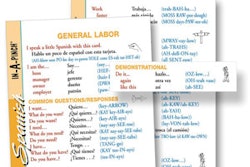If you are like most business owners, you are continually frustrated by employees who work slower than you would, who care less about your clients than you do, and who believe low quality work is acceptable.
If you've been around a lot of employees for any length of time, you have witnessed most or all of the following causes of poor performance:
- General laziness.
- Lack of passion for the job.
- Anger at the owner or immediate boss.
- Poor fit to the position.
- Oblivious to expected performance.
- Trouble at home.
- Lack of financial incentive.
- Lack of appreciation of the customer's importance to future sales.
In this first newsletter on the subject, we are going to address the most universal and effective solution: eliminating employees' confusion over required performance. I will address the other problems in future newsletters. In my many years of helping contractors run profitable businesses, I have found that companies tend to fall cleanly into one of three groups.
The first group never communicates performance expectations to their field workers and only casually communicates them to their office workers. The field workers are told "Here's the job. Get it done." The office workers are told "Here are the tasks. Get 'em done." Office workers receive simplistic job descriptions when they join the company. This group has by far the largest membership.
The second group tries to establish performance expectations, but is clumsy in its approach. These contractors share the product budget ($$$) with the foreman or crew leader. They will have some form of official quality standards or checklists. They will have fairly thorough job descriptions for their office staff. The job descriptions tend to be written as generic roles and responsibilities. The group also is well populated.
The third group strives to communicate very clear performance expectations to its employees. These companies tend to monitor task performance closely. They also tend to have highly productive employees. This group has just a handful of members.
Which group does your company belong to? If you are in groups one or two, you'd best keep reading. The most effective way to elevate employee performance is to set very clear, task level expectations:
- Identify every important task the employee is to perform.
- Set specific performance standards for each task.
- Prioritize the tasks.
- On field work, share schedules, budgeted man-hours, and set daily performance goals.
- Document the expectations.
- Explain all of this to your employees.
You must arm your employees with the ability to know whether they have had a successful day. You must give yourself the ability to evaluate daily, weekly, and annual job performance in a manner that is not reliant on your personal feelings for the employee.
You need an unbiased measuring stick. Your employees need to know you use an unbiased measuring stick. Except for the occasional odd-ball, employees are very rational people. If they believe you have reasonable expectations for reasonable compensation, they will work hard to achieve the goals you have set for them.
When you fail to communicate performance expectations you leave your employees in limbo. Most employees will fill the void by defining success as whatever they got done that day. This is often a mindset owners are unable to relate to. Owners are typically driven by a fear of failure. Employees typically are not. Not that employees like to fail, but most are not afraid of failing.
You can't change their tolerance of failure, but you can tap into the addicting feeling of success. Give your employees the ability to know when they really did succeed...and the painful awareness of when they didn't!



















